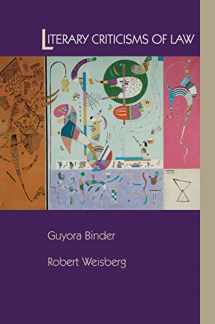
Literary Criticisms of Law
ISBN-13:
9780691007236
ISBN-10:
0691007233
Author:
Robert Weisberg, Guyora Binder
Publication date:
2000
Publisher:
Princeton University Press
Format:
Hardcover
554 pages
FREE US shipping
Book details
ISBN-13:
9780691007236
ISBN-10:
0691007233
Author:
Robert Weisberg, Guyora Binder
Publication date:
2000
Publisher:
Princeton University Press
Format:
Hardcover
554 pages
Summary
Literary Criticisms of Law (ISBN-13: 9780691007236 and ISBN-10: 0691007233), written by authors
Robert Weisberg, Guyora Binder, was published by Princeton University Press in 2000.
With an overall rating of 3.5 stars, it's a notable title among other
books. You can easily purchase or rent Literary Criticisms of Law (Hardcover) from BooksRun,
along with many other new and used
books
and textbooks.
And, if you're looking to sell your copy, our current buyback offer is $0.51.
Description
In this book, the first to offer a comprehensive examination of the emerging study of law as literature, Guyora Binder and Robert Weisberg show that law is not only a scheme of social order, but also a process of creating meaning, and a crucial dimension of modern culture. They present lawyers as literary innovators, who creatively interpret legal authority, narrate disputed facts and hypothetical fictions, represent persons before the law, move audiences with artful rhetoric, and invent new legal forms and concepts. Binder and Weisberg explain the literary theories and methods increasingly applied to law, and they introduce and synthesize the work of over a hundred authors in the fields of law, literature, philosophy, and cultural studies. Drawing on these disparate bodies of scholarship, Binder and Weisberg analyze law as interpretation, narration, rhetoric, language, and culture, placing each of these approaches within the history of literary and legal thought. They sort the styles of analysis most likely to sharpen critical understanding from those that risk self-indulgent sentimentalism or sterile skepticism, and they endorse a broadly synthetic cultural criticism that views law as an arena for composing and contesting identity, status, and character. Such a cultural criticism would evaluate law not simply as a device for realizing rights and interests but also as the framework for a vibrant cultural life.


We would LOVE it if you could help us and other readers by reviewing the book
Book review

Congratulations! We have received your book review.
{user}
{createdAt}
by {truncated_author}


